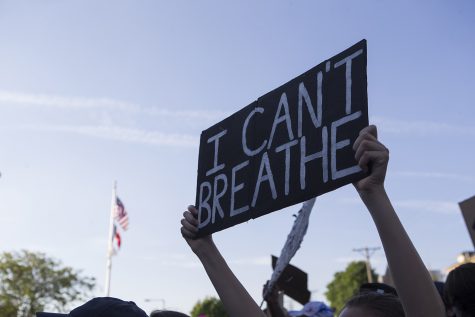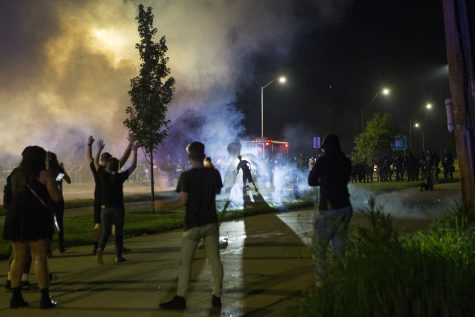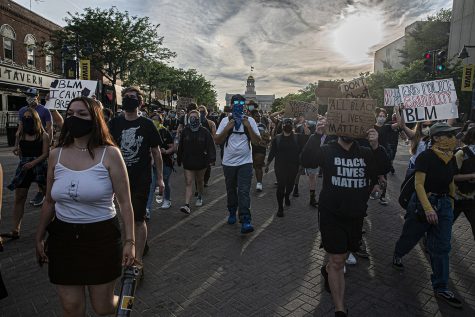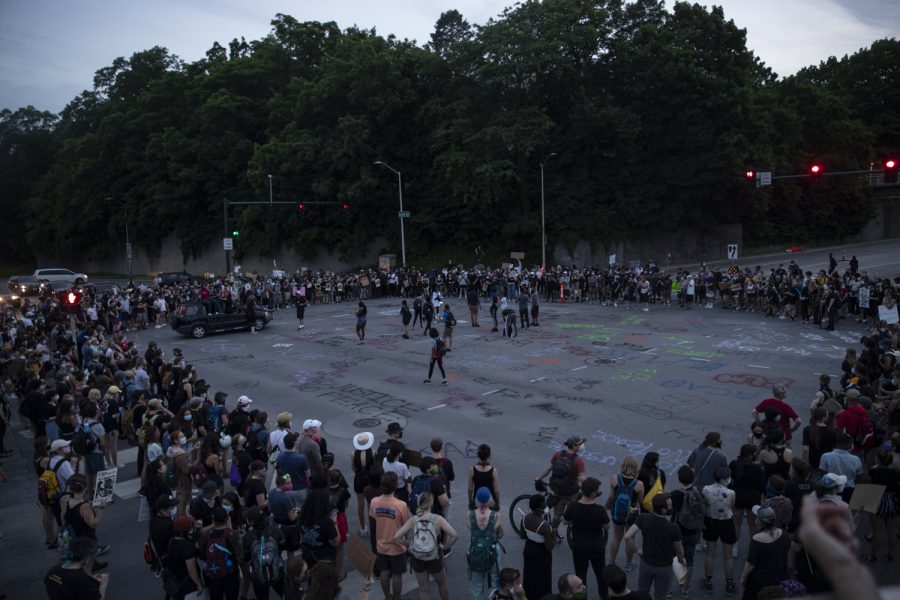Creating change in Iowa City: The Iowa Freedom Riders
The group, which has led the force for change in Iowa City in coordination with the Black Lives Matter movement over the course of the summer, spoke about how they formed and how they plan to continue to push for lasting change.
A crowd participating in a march to support the Black Lives Matter movement and protest police brutality stops at the intersection of Burlington Street and Riverside Drive to spray paint the intersection and chant in support of their cause.
Near-daily protests against systemic racism and police brutality swept Iowa City throughout June and have continued intermittently into July. At their peak, protests reached numbers of nearly 3,000 participants, shut down Interstate 80, and have brought the city’s governing bodies to pass new resolutions to address issues at the heart of the unrest. Leading the force are a group of young Iowans from in and around the area, known collectively as the Iowa Freedom Riders (IFR).
The Daily Iowan sat down with several members of the IFR for an interview on the group’s origins, the status of the movement, and where they plan to go from here.
Some IFR organizers wished to remain anonymous because of threats from white supremacist groups and people antagonistic to their movement, as well as fear of retribution from the police.
Forming the Iowa Freedom Riders
Near the end of May, a group of friends were hanging out when they watched the video of George Floyd’s killing in Minneapolis. The emotions felt after viewing the video sparked a desire to join the protests in the city that had become the epicenter of a national movement, IFR organizer Tina Deng said. The first rally in Iowa City was on May 30 on the Pentacrest and was organized by a few members who would later become the IFR. Afterwards, several people went to protest in Minneapolis.
When they returned, Deng said the group wanted to continue fighting for change. She and her friends began to think about how they could bring the movement happening in Minneapolis and other cities to Iowa City.
“When we came back, we realized Iowa City also needed to get on the movement of changing things and rectifying things that are going on in its own community before we start going out to help others in their community,” she said.
The group named themselves around a month ago as hundreds — and sometimes thousands — of protesters nightly winded through the streets of Iowa City in coordination with efforts of the national Black Lives Matter movement to address systemic racism. A few spokespeople from the group have appeared at city council and local school board meetings to present and discuss a list of demands they curated to enact change.

Rather than citing individual leaders, organizers of the IFR said they prefer to see the group as a collective organization. According to IFR member Akia Nyrie Smith, 25, anyone can be an Iowa Freedom Rider as long as they stand for the same ideals the group does.
“Any person who stands by our demands and wants to help implement those demands is a Freedom Rider off that bat, you don’t even have to be from Iowa,” they said.
Related: Iowa Freedom Riders seek to share personal stories of racial injustice with Iowa City City Council
A member of the IFR who requested to remain anonymous said the structure of the group allows voices to be heard collectively, too.
“Every member of the community is involved in IFR. Every member, if they want their voice to be heard, can have their voice be heard within IFR,” they said. “We provided that platform where so many voices that felt like they were unheard in the community could come to our platform and share their stories and share their own insight about [how] it feels to be part of a marginalized community in Iowa City.”
The group publicly named themselves on June 5 during a march to Interstate 80 in honor of what would have been Breonna Taylor’s 27th birthday. The group launched an Instagram account to improve communication of protest details and updates the same night. Over 7,000 people now follow the account.
The group’s name itself has a historical tie. According to Akia Nyrie Smith, the name stems from the Freedom Riders, a group of civil rights activists who protested segregated bus terminals by participating in bus rides through the South in the ‘60s. Wylliam Smith, 22, Akia’s brother who handles public relations for the IFR, said the group also chose not to specifically name the group the “Iowa City Freedom Riders” in order to be more inclusive.
Editor’s note: Wylliam Smith is a former columnist for The Daily Iowan.
“Our movement is similar in that way, in that we are not here to cause violence, and we are not here to promote chaos,” Akia Nyrie Smith said. “Instead, we are here to ride for those who deserve to be free, and we are going to ride all the way through.”
Protesting for change
As the protests grew throughout June, the IFR added structure to their organic movement. The group enlisted volunteer security detail, who rode ahead of the crowd and on the perimeter to scout for police and block off roads to make sure the group was moving on the planned route.
Volunteer medics also offered medical assistance when necessary. On June 3, State Patrol and Iowa City Police Department officers deployed tear gas on peaceful protesters, and medics offered water for people’s eyes, treated injuries, and helped transport people away from the gas.
our arms were linked and we were shouting hands up don’t shoot. pic.twitter.com/3g4NHG1cPe
— Antifa Head of Cyberbullying (@dimadumb) June 4, 2020
Others opened up their apartments and houses for people to shower or stay the night if they needed, and organizers routinely received donations to provide free food and water for people in attendance.
“Literally there was any kind of help and organization that needed for this protest to happen, it was there,” Akia Nyrie Smith said.
Alex Cavillo, 22, attended the protests from the beginning and became a leader for the medic team, facilitating communication between IFR leaders and about 80 volunteer medics in a group chat.
Cavillo worked as a lifeguard for many years, and he is pursuing training as a paramedic. He said he was right up front on June 3 when officers used tear gas and flash-bangs on protesters and described the night as one of the scariest moments in his life.
“I was trained as a lifeguard that as soon as something goes wrong you help immediately. There’s no questions, no if, and, or but — there’s: you go, you help,” he said. “I was very confident in that, of being able to just take action immediately and not hesitate, because as you’re trained in these certifications, it comes as routine.”

Protesting can also be physically and emotionally exhausting, organizers said, so they try to infuse the protests with joy and excitement to keep up morale. At a few protests, drummers and trumpeters played along to chants. The crowds broke into dancing and singing in street intersections on several nights.
Akia Nyrie Smith said finding joy while fighting for a serious cause can be an important part of activism. The serious and the joyful are not opposites, they said.
“If you know the different personalities in IFR, we are very high-spirited and fun people, so we can protest but we can also have fun with the chants,” Deng said. “Protesting is a very draining thing. People get tired from it. It gets boring if you’re just walking and chanting. Add some drums, add a beat, add different chants — and it can be a party too, but we still know what we’re fighting for and what we’re there to do.”
Pushing for institutional change
As demonstrations in the streets continued throughout June, the IFR began to take their message indoors, to the halls of Iowa City’s governing bodies. The group made a list of 12 demands for the Iowa City City Council and drafted a list of demands for the school board, too.
Some members of the City Council have long shown support for the group’s mission. Mayor Bruce Teague offered a speech at the very first protest on May 30, and he marched with protesters and other city councilors on June 4, the day following the tear-gassing incident, with the vow that a similar incident would not happen again.
The council passed a 17-point resolution in June addressing the group’s demands and committing to several steps of action to curb aggressive policing, give civilians more overview of police conduct, and address social justice in the city.
Since the passage of the resolution, the group has requested a presence at council discussions of their demands. Groups that bring proposals to the City Council are usually allowed to give a presentation and answer questions when the council takes up a proposal, but a semi-permanent reserved seat for council discussions is uncommon.
Related: Iowa City staff responds to Iowa Freedom Riders’ demands
The idea has created a rift in the council — Councilors Laura Bergus, Mazahir Salih, and Janice Weiner said they’re in favor of providing a platform to the group, but Teague and Councilors Susan Mims and Pauline Taylor said they were uncomfortable allowing the group to speak for the whole community.
“When we’re talking about the community of Black people, people of color within our community, IFR is only one portion of that. We have the Black Voices Project that has been out there advocating…I don’t believe personally that Iowa Freedom Riders has been that elected person to represent all Black people,” Teague said in a July 8 council work session.
IFR organizers said they’ve made their best efforts to reach out to representatives of other groups and Black leaders in and around Iowa City. Akia Nyrie Smith said the group had meetings with “movers and shakers” in both Iowa City and Cedar Rapids while drafting the demands, and creating them was a collaborative process.
“We do realize that we do not speak for all of BLM, in either the state, the world, or even Iowa, or even Iowa City, which is why we never donned the title ‘BLM,’” Smith said. “And we do realize that it is not fully possible at this moment for us to speak for every single BIPOC individual within our community, both Iowa City and Iowa as Iowa Freedom Riders. Our issue primarily with the city council and more specifically with Bruce Teague is that with what we have been able to present and give them within these demands was something we curated with as many voices, both BIPOC and not, as possible.”
Continuing the momentum

While IFR has made progress, the group agrees that there is still plenty to be done. According to Akia Nyrie Smith, the organization’s work may never be over as it continues to address new topics and deep-seated systemic racism, even after the demands are met locally.
IFR organizers also said that even though they have been leading fewer marches in the past weeks, the movement in Iowa City is by no means losing steam.
“Momentum works in many ways,” Wylliam Smith said. “Just about every City Council meeting that we’ve had since [physical protests] had an IFR section if they have not been completely dedicated to the IFR. So it’s like, yeah, we’re not in the street at this current moment, but realize that the momentum is still there and you can tell that just by going to a City Council meeting and hearing them talk.”
For Akia Nyrie Smith, the tenacity of the movement in Iowa City comes from the people driving it forward.
“It’s contagious, when you see and meet the different people that come in and give their talents and help organize,” they said. “It gets contagious to see their fire and their passion to keep pushing until actual change happens — not just small things, but actual transformative justice.”



